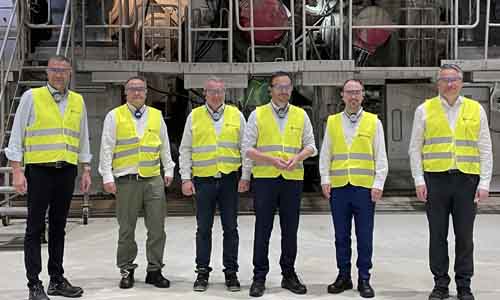
Progroup follows a consistent zero-waste system at its Eisenhüttenstadt site. Dr. Jan Redmann, chairman of the CDU group in the Brandenburg state parliament, was able to see this for himself when he visited the containerboard and corrugated board manufacturer.
The industrial zone on Oderlandstraße is home to the PM2 paper factory and the waste-2-energy power plant which is connected to it. This is where Progroup manufactures around 650,000 tonnes of containerboard every year – using resources very efficiently thanks to its state-of-the-art facilities. “We rely on innovative high-tech machines in all our plants so that we can manufacture products in an extremely eco-friendly and efficient way,” explains Maximilian Heindl, deputy CEO of Progroup.
The papers produced at the site reflect this idea of sustainability. First, they are made without using any fresh fibres at all; Progroup only ever uses recovered paper. Second, the Next Fibre products are much lighter compared to conventional papers and yet are extremely high-performing – a material advantage that is evident during transport, for example, and saves CO2. And third, once the containerboard has been used, it is recycled again as recovered paper. This makes it an excellent product for recycling.
Own, sustainable energy supply
The energy required for papermaking is supplied largely from the waste-2-energy power plant. It thermally utilises what are known as rejects – waste materials, in particular from paper production directly and also from industry – and then supplies PM2 with hot steam. It also produces electricity. The amount of electricity produced is equivalent to roughly 50 per cent of the power that PM2 requires. This allows Progroup to reduce the use of fossil fuels and save a lot of CO2.
“The current energy situation once again demonstrates that we are on the right path with this zero-waste system,” says Heindl. “This is why we will consistently carry on embracing and developing it and adopt the concept at other sites as well.”
For example, the family business already has plans to construct its next power plant.
“Progroup and the Eisenhüttenstadt site are a fine example of recycling. Companies with innovative, sustainable concepts like this are needed to tackle challenges like the energy and climate crises we face,” says Dr. Redmann. “This is why we support energy-intensive companies, like Progroup, that are also working on advanced, strategically important hydrogen concepts for the future. The whole of our Brandenburg economic region will benefit from this.”
Progroup has operated its PM2 paper factory in Eisenhüttenstadt since 2010. The power plant was commissioned one year later. Both projects have already resulted in investments of 750 million euros. Progroup will continue to rely on its Eisenhüttenstadt site in the future. The company provides around 200 state-of-the-art jobs.

































